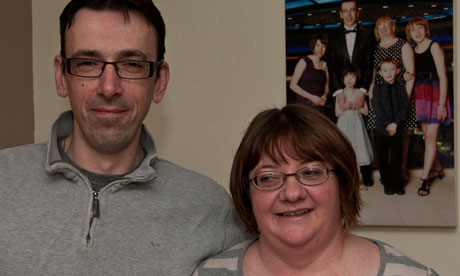
- The Dalleys are now facing an annual bill of £1,200 from the council for school transport for their three daughters who have learning disabilities. Photograph: Charles Shearer
![]()
Richard Atkinson
Richard Atkinson (left) has multiple sclerosis. He was diagnosed seven years ago when he was in his late 40s. He walks with an aid.
When he went into hospital for a hernia operation, his wife Frances suspected he wouldn’t respond well to the surgery, so she tried to access an occupational therapy (OT) assessment to get stair rails.
They did an assessment over the telephone, but then said it would be three weeks before someone could come round.
Frances Atkinson says that when her husband returned from hospital barely able to move, she could not get him up the stairs. “He couldn’t get to bed. He couldn’t get to the toilet. The only thing we had got was a bucket. That was the weekend from hell.”
Richard Atkinson was offered a reablement package by his council – “someone coming in twice a day to help Richard get washed so that I could go out to school and pick up our six-year-old, but there was a catch-22,” Frances Atkinson says. “The careworkers wouldn’t help Richard up the stairs because the OT assessment hadn’t been done.” It all feels as though “your house is burning down and nobody can see it”, she says.
Lisa Henshaw
I start to understand that cuts might be leading people to take risks with themselves when I go to Lisa Henshaw’s house (not her real name) and find her front door unlocked. Henshaw, 48, has rheumatoid arthritis (diagnosed at the age of two). She has limited use of her hands and mostly must use her electric wheelchair to move. This morning, she woke up feverish. I find her lying on her bed next to a red plastic container that her carer left out in case she needed to be sick.
Henshaw is alone because her carer has run out of carer hours. Direct payments from her local council fund about five carer hours a day (starting with a couple of hours in the morning to help her bathe and dress). The front door was unlocked because she was waiting for medicine to be delivered. I wait and sign for the drugs and make Henshaw her mid-morning hot drink. Then I leave her to her problems. She has plenty. “I never had to worry like this before,” she says.
The Dalleys
It’s the relentlessness of the attacks and the uncertainty, says Jen Dalley (left). She and her husband have three young daughters with learning disabilities. The youngest is in a wheelchair and can’t walk, speak or feed herself. All three girls attend special schools. The family relies on benefits and the council for care service. The council is proposing to start charging for school transport, which would cost the Dalleys £1,200 a year: money the family simply doesn’t have.
The Dalleys say they’ve been called scroungers by people on the street and even by their family. “I always say to them, you come and live in my house for a week and then we’ll see,” says Dalley.
• More dispatches from people on the frontline of austerity Britain at katebelgrave.com and twitter @hangbitch or @falseecon
guardian.co.uk © Guardian News & Media Limited 2010
Published via the Guardian News Feed plugin for WordPress.


2 Responses
Yes it always easier to attack the vulnerable as you think they will not bite back, well as a coordinated campaign becomes reality, those who seek to try and destroy the lives of the disabled and vulnerable will find themselves answerable for their crimes.
yes we all bloody scroungers think whot you may but walk in our shoes and i would think you be crying to go back to the way you now as for scroungers odnt you think the goverments are brain washing you into this hate campain against people on benefits wake up bcause it could be you shortly and you wont beleive whot you got to do to get whot benefit you intitled to good luck if yo uare jeff3